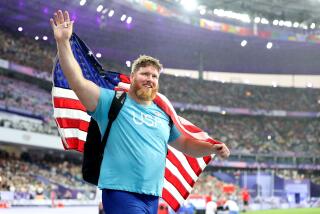Reynolds and Barnes Walk the Same Road : Track and field: World-record holders in their respective events are appealing their bans from competition by The Athletics Congress.
- Share via
One runs in the cavernous Big Ten stadium where he was cheered in his college days, daring to dream that he might be allowed back into his sport to win another Olympic gold medal.
The other escaped to San Diego for part of the winter, to try out for the NFL, lift weights with his best friend and get a tan. He too hopes he can return to the event he has come to master.
It used to be that if Butch Reynolds ran fast enough, or Randy Barnes put the shot far enough, they could make the U.S. Olympic team and win a medal. It was the simple equation of an athlete’s life: If you work hard and perform well, you can win big.
But it’s not that way anymore. The problem for Reynolds and Barnes, the world record-holders in the 400 meters and shot put, is that they no longer control their athletic futures. They compete now not in stadiums, but in lawyers’ offices and paneled hearing rooms.
They each have tested positive for anabolic steroids, and although they steadfastly maintain their innocence and are fighting the charges, they now are outcasts, banned by the international track and field federation for two years from pursuing the only careers they ever have had.
Last November, word came that Reynolds and Barnes, two of the most prominent track and field athletes of their time, had tested positive for steroids at separate meets in Europe in August.
They each immediately and independently denied the charges and mounted aggressive legal campaigns to clear their names. At present, they are caught in a vast web of legal proceedings.
Barnes is involved in the appeals process of The Athletics Congress, track and field’s governing body in the United States. Reynolds also has begun TAC appeals procedures after having just been told by a U.S. District Court judge in Columbus, Ohio, where he lives, that he must exhaust those appeals before the court can hear his case.
While Reynolds has kept quiet about his legal defense, Barnes has gone quite public, questioning the validity of his urine tests, saying the chain of custody of the urine samples he provided in Malmo, Sweden, was broken at least five or six times. The only public comment Reynolds has made about his case, other than denying ever using steroids, was to say in November that there was “some fallacy” in the drug test administered to him in Monte Carlo.
“I have very hard days and very easy days,” Reynolds said recently in a rare telephone interview. “An example of a hard day is to go to Greg’s (his attorney, Greg Lashutka’s) office and spend eight hours on the phone, trying to clear my name.”
“It’s a stigma I’ll have to live with the rest of my life,” Barnes said during a January news conference in the Washington office of his attorney, John Dowd. “The only comfort I have is taking out my aggression on the weights.”
Ironically, although Reynolds and Barnes hardly know each other, they are linked, perhaps for a lifetime, by the identical timing of the news of their suspensions. Everyone involved with each athlete wishes the two could be viewed individually. But that probably never will happen. Reynolds and Barnes. Barnes and Reynolds. They share too much to be put in different sentences.
Both were silver medalists in the 1988 Olympics in their specialties (Reynolds won the gold medal with the U.S. 4x400-meter relay team). Both hold the world record in their event, a rare feat for an American nowadays. Both are young -- Reynolds is 26, Barnes 24. They have one, perhaps two, Olympics still ahead.
Both earned more than $100,000 a year from appearance fees and endorsements. Both would have been favored to win at the prestigious world championships this summer in Tokyo. Should they have performed well there, they would have been among the favorites to win at the 1992 Olympics in Barcelona.
Now, they also share a stigma that neither man is prepared to accept. For that reason, they continue to train as if they have a meet next week. Perhaps it’s self-deception, for no matter how often each says he has never used performance-enhancing drugs and no matter how many other people wonder about the circumstances that brought down these two American stars, it seems unlikely they can win their cases.
But they train. For what? Who knows?
Reynolds was an Ohio State star with an impressive list of credentials, when, on the night of Aug. 17, 1988, in Zurich, he broke the second-oldest record in track and field. Lee Evans had held the 400-meter world record of 43.86 seconds for nearly 20 years, having set it minutes after Bob Beamon long-jumped 29 feet 2 1/2 inches in the infield of the stadium at the 1968 Olympics in Mexico City.
Reynolds ran the distance that night in Zurich in 43.29 seconds, and as the crowd chanted, “Reynolds! Reynolds!” he ran a victory lap with his brother, Jeff, who had run in an earlier race.
Little more than a month later, Reynolds lost in the Olympics to UCLA’s Steve Lewis, settling for the silver medal in a U.S. sweep of the event. But he won his gold medal in the relay with the tremendous U.S. team.
In Columbus, he was a hero. When he and his wife, Lillian, bought a house in the suburbs and drove up, they found a front yard full of signs with various messages: “Welcome to the neighborhood, Butch Reynolds, Olympic gold medalist. And his wife too.”
“I realized I was a role model for so many kids out there,” he said. “There might be 1 million kids who look up to Butch Reynolds and there might be a hundred million who look up to Michael Jordan, but those 1 million are important. I want to touch every one of them. ... When this happened, I was really afraid of how these kids and their parents would react. But they’ve been great, really supportive, telling me to hang in there.”
While he said he definitely plans to stick around for the 1996 Olympics in Atlanta, Reynolds won’t rule out a change of sports. Football always was his first love, and the Cleveland Browns have said over the years they would be interested in seeing what this former high-school wide receiver and free safety can do.
“I want to clear my name before I make any kind of move,” said Reynolds, who is 6 feet 3 and weighs 185 pounds.
Interestingly, football is another common denominator in the stories of Reynolds and Barnes. Recently, Barnes, who is 6-5 and 300 pounds, worked out for the San Diego Chargers and was impressive as an offensive-line prospect. He said the Chargers have offered him a contract, and he plans to sign with them unless the Cincinnati Bengals or San Francisco 49ers -- both of whom have shown interest -- offer him a better deal.
“I’m going to make a commitment to football,” Barnes, who played in high school, said recently. “With the way I’ve been treated by TAC, I feel no loyalty toward them. I have to take care of myself. I can’t sit stagnant anymore. This has been a real bright spot in an otherwise dark situation.”
If he ends up in the NFL, Barnes will have left behind a sport he has conquered. At the 1988 Olympics, for “five very tense, feverish minutes,” Barnes said he thought he had won the gold medal with a put of 73 feet 5 1/2 inches. But East German Ulf Timmermann, then the world record holder, used his very last throw -- 73 feet 8 3/4 inches -- to beat Barnes by 3 1/4 inches.
“I felt I was a spectator and no longer a competitor in the event,” Barnes, of South Charleston, W.Va., said then.
In May 1990, at a meet at UCLA, Barnes got a measure of revenge, stealing the world record of 75-8 from Timmermann with a heave of 75-10 1/4. He had predicted he was ready to break the world mark, and, in anticipation, the shot-put ring was bordered with balloons and a massive sign reading “75-8” was planted in the landing area.
“It happened like it should,” Barnes said.
But Barnes wasn’t going to stop there. His car license plates read “80 FEET,” although his brother, Lee, said Randy is driving an old family car now and the plates are in the garage.
“As a brother, I’m incredibly saddened by what’s happened to Randy,” Lee Barnes said. “He struggled as a kid. He always was big and endured a lot of ridicule. It was exciting to watch him come into his own.”
Being so large, Randy Barnes said he knows people think he uses steroids, which he says he never has.
“That’s something I’ve been dealing with for years,” he said. “I’ve always had to live with that doubt. I hear the whispers over my shoulder. There’s a lot of resentment. I’ve spoken outwardly about that. It’s frustrating for a lot of athletes to hear those criticisms.”
Lee Barnes said his brother is “extremely bitter” about the process that led to his suspension.
More to Read
Go beyond the scoreboard
Get the latest on L.A.'s teams in the daily Sports Report newsletter.
You may occasionally receive promotional content from the Los Angeles Times.






